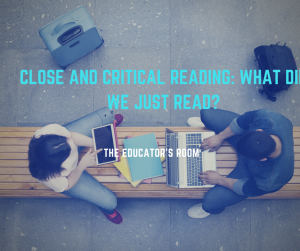 Last week, I introduced the concept of Close & Critical Reading (CCR). While we begin the strategies with all ages, we (currently) use the vocabulary of CCR starting with our seventh graders.
Last week, I introduced the concept of Close & Critical Reading (CCR). While we begin the strategies with all ages, we (currently) use the vocabulary of CCR starting with our seventh graders.
The first of the four questions is “What is the text about?”
This seems easy enough, having students summarize what they read, however, many kids have a hard time with this for various reasons. Some students are afraid they won’t write down enough, so they write down every. single. detail. Their “answer” for summarizing a text is almost as long as the text itself. Other kids feel that one sentence is enough, usually just rewriting the title.
Teaching summary is difficult because it requires a LOT of modeling, but it’s incredibly beneficial to students in all areas of the curriculum. It teaches students to break down texts into smaller, more usable chunks. It is a key strategy for note-taking and studying as well. If a student don’t know what she just read, she can’t move deeper into analyzing or evaluating it. She is stuck at lower-level thinking, and worse, she is lost in most of her classes.
One strategy we use district-wide is the One Sentence Summary. I will give my students an essay or story and tell them to write a summary of what each paragraph was about in the margin. When they are done, a volunteer will come up and put his/her sentences on the board. As a class we will discuss if the sentences captured the main ideas, if they missed anything, or if there was any extraneous information. We revise together and what we have left, should be a good summary of the piece we read.
This technique can work in any subject area with many grade levels. I currently use it with eighth graders, but it would be appropriate for high school students too–especially when you have them working with a difficult text.
When texts get particularly difficult, I will break my class into groups and give each group ONE paragraph of the text. As a group they have to come up with ONE summary for their paragraph. Then we will put it all together so the class can see a summary of the difficult text to see why we would break it down this way–to make it easier to digest and understand.
Another strategy I have used is the Text to Tweet. I like to do this with fiction because I feel like stories lend themselves best to this strategy. This works well as a closing activity or a Ticket Out the Door. If we have been reading something together, I will have my students write a tweet (140-characters) about what we read about that day. This tells me two things: A) did they understand the book we are reading and B) Can they effectively summarize. Sometimes I have them do this about their independent reading books as well so I can get a quick glimpse at what everyone is reading.
I also teach students to Actively Read by underlining main points as they read (if they are allowed to write on the text).Once we have established how to determine if something counts as a “main point,” I have students underline it as they read. This serves to help them summarize after they’ve read as well as to easily spot things they should study.
Many teachers mistake having students summarize as a way to see if kids have read something, so when a student writes a three page “summary” of a two-page article, they give them full points and move on.
But this sends the wrong message to students. Yes, we should celebrate that a student read the material, but the skill of constructing an effective summary needs to be worked on. It is a skill students will need their entire life.
Please share any strategies you have for helping your students write good summaries.




Leave a comment